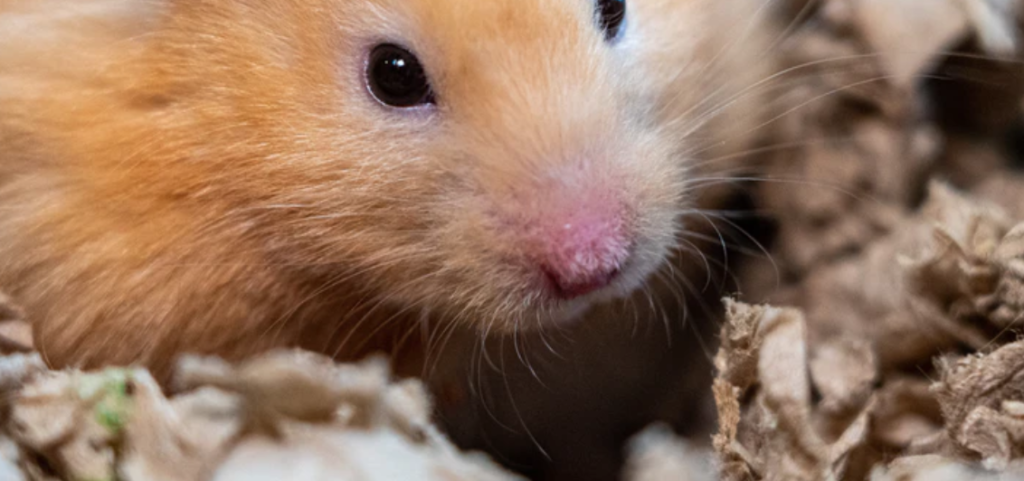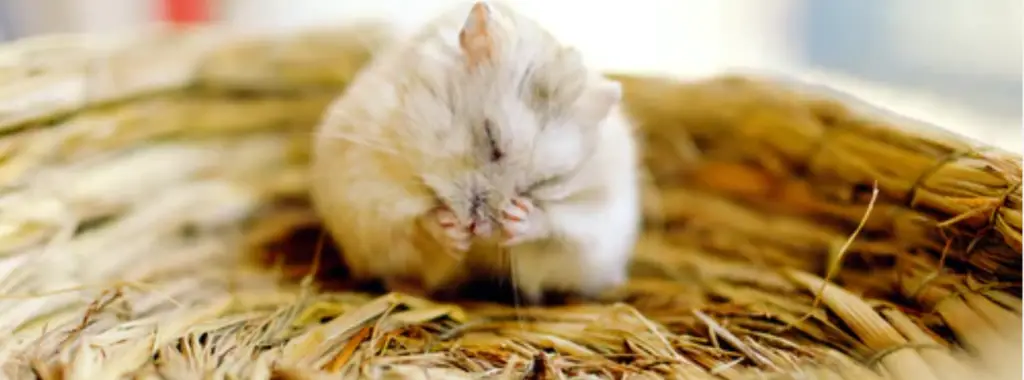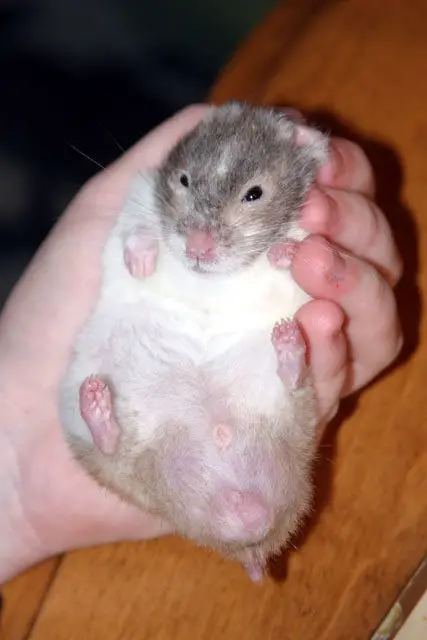How to care for an old Hamster?
When your hamster starts to show signs of age, you will have to adapt his cage to make it easier for him to move around, give him a softer and easier to chew food, help him to groom, and pay more attention to his health without having to go back and forth to the veterinarian, which will only stress him out even more
What are the signs of old age in hamsters?
First of all, let’s see how to know if my hamster has become senior and what are the signs of old age in hamsters.
Hamsters have a short lifespan and generally, a hamster starts to get old as soon as it is one year old since it reaches its maturity only after 2 months.
Around one year old, hamsters are said to be middle-aged.
A hamster is said to be old when it reaches 18 months (one and a half years), so all the following advice will only apply to hamsters 13 months and older.
Signs that your hamster is getting old:
We recognize a hamster that is getting old when it shows certain signs, these signs of old age are common to all hamsters, here are the most common:
Your hamster’s life rhythm will slow down, he will become less active.
Less grooming and rare sandbaths so you have to help your hamster to keep himself as clean as possible.
The hamster will use his wheel rarely and for less time than before.
His 5 senses will diminish, he will not hear as well as he used to (he will react less to noise and your voice), and his eyesight (due to cataracts) and hearing will also diminish so he will not venture out as much as he used to and most importantly he will not look for and find his food and will not dig in his litter box as much, so put his food in plain view in his bowl.
An increasingly curved back
Eyes that are less and less open generally lose their brightness with the beginning of cataracts.
As your hamster gets older, it will sleep a little more than before and you will see it less and less and its appearance will be short-lived.
Your hamster will sleep everywhere in his cage (sleeping in the open), on his wheel, in his sandbox, just in the middle of his cage …
Hamsters lose weight progressively as they get older, 1 gr to 2 gr over several days, note that rapid weight loss can hide other diseases.
The hamster will start to lose its curves, have a thin face, you will even distinguish its neck, its spine …
The old hamster will start to lose hair and his fur (especially on the top of his head) will become thinner and thinner and you will start to see some of his skin.
Your hamster will not eat and drink as much as he used to, and he will start to not be able to eat hard food (hard, chewy seeds).
Hamsters that get older may show kidney problems.
How do I care for an aging hamster?
As with us humans, hamsters that are starting to get old will need a little help and some new accommodations.
So here’s what you can do to make life easier for your senior hamster:
1-An old hamster needs a suitable cage:
You can downgrade its enclosure to a bin cage, not too small but just a bit smaller than the usual one (not less than 500 inches square)
It’s also time to move your aging hamster’s cage to a place that is quieter, has an ideal room temperature that doesn’t change overnight, and is dry and away from drafts and direct sunlight.
Remove shelves
They will feel colder ( keep the temperature between 20-23 C/68-75 F ). so you may need for that
Softer bedding like paper-based bedding
Extra nesting material like toilet paper ( so they use it to stay warm ), you need to keep your old hamster’s cage at a good temperature and avoid cold spells and sudden drafts.
Add Extra substrate
Change the litter box more often because an older hamster tends to urinate all over the cage and will not reserve two or three places just for toileting (like he used to do)
Remove climbing toys and stairs and all the things that your old hamster could venture on and risk a fall that could be fatal.
To prevent them from breaking their teeth, which have become brittle with age, remove all hard materials that they used to chew on.
Leave the wheel on so he can continue to exercise, especially if you move him to a smaller cage.
If the vet recommends it, you can remove the wheel to avoid tiring your hamster’s heart.
2- An older hamster needs a special diet:
As your hamster gets older, its digestive system will start to get tired, and digesting food will become more difficult and slow.
You will also notice that your hamster will eat less and there will be less dropping than before in his cage.
You should adapt his food to his advanced age, to his health condition as well, because his teeth will become fragile and can break easily if he bites into a hard seed shell.
His jaw will also lose some strength and it would be good if you remove the seed shells when possible.
Your aging hamster will also need food that is richer in nutrients and protein but easier to chew such as:
- Boiled and scrambled eggs
- Baby food like Love Child organics ( apple, sweet potato, broccoli, and spinach)
- Wet the pellet ration and make it like a dough that will be easy to chew on and swallow.
- walnuts, carrots, and boiled brown rice
- Low-fat cottage cheese, cooked fish or chicken meat
- Cucumber
- Steamed veggies
- Dry or soaked Weetabix
- Low-fat natural yogurt
- Fresh corn ( small amount )
The idea is to give your senior hamster more fresh food, easy to chew and digest like vegetables he loves to eat, and pieces of fruit rich in vitamins but not too sweet …
You can also pre-mix his food by putting it in a blender (you can make a soft paw of his seeds and his dry food).
Don’t forget to make it easier for your hamster to get his food and water by bringing his food closer to his nest, don’t scatter his dry beards all over the cage but put them right next to his food bowl.
When a hamster becomes old, it will be more difficult to use the bottle to drink, so put a bowl of water for your hamster.
3- Help your old hamster stay clean:
As your hamster gets older, it will start to neglect its cleanliness a bit.
You’ll notice that he’ll start to have a dirty backside, fur that’s not smooth, and a bit clumpy…
Your old hamster will not take as many sand baths as before, because these baths need a lot of agility that an old hamster does not necessarily have.
You will help your hamster clean himself and eventually take his daily sand baths in order to smooth his fur and remove the excess oil and keep a well-insulated fur, which will keep him warm during the night.
Your hamster is used to doing most of his exercise at night, but as he gets older he will get colder at night due to hair loss and lack of food…
You must therefore help your hamster to be warm at night and especially encourage him to exercise.
You will actually have to help your hamster to exercise by encouraging him to use his wheel, you will just take him and put him on it, he may not be able to climb on his wheel by himself and it would be nice to help him.
Don’t force him too much, and don’t forget that a 2-year-old hamster is the equivalent of almost 80 years old for humans.
4-Be more attentive to Common hamsters diseases symptoms :
The immune system of your old hamster will weaken because he doesn’t eat as much as he used to and he probably lacks minerals and vitamins.
You should therefore help him with supplements but above all be more attentive to the symptoms of common hamster diseases such as wet tail and discharge from the eyes, nose, and ears…etc.
This way you could intervene and take your old hamster away from the beginning of the disease which could save his life.
You should not cause them unnecessary stress by taking them to the vet every time!
You should know that when your hamster becomes old, it will show signs that can worry you but that is just normal for an old hamster, I explained them at the beginning of this article.
You just have to let your hamster live his days at his own pace and don’t be alarmed if you see him sleeping in his wheel for example, or eating less…etc
5- An old hamster will surely die one day:
When the time comes to let your hamster go, you should do it for its own good instead of doing everything to keep it alive despite its suffering.
Nature often does things well and when the time comes for your hamster to leave, he will surely let you know one way or another you must respect his will and let him go in peace instead of making him suffer more with trips to the vet and treatments that will only make his suffering last.
Death is also part of your hamster’s life, explain this to your children and let your hamster go to hamster heaven too.
why is my old hamster squeaking?
Hamsters usually squeak to show their displeasure, anger, stress, or pain from a broken leg or boot or a bad back.
But when your hamster is old and you know he doesn’t have much time left to live, it could, unfortunately, be something even more serious. be something even more serious.
Older hamsters may have noisy breathing when they are sleeping or this could mean that your hamster does not have much time left to live (less than 48 hours usually).
Hamsters may squeak when they are in pain, a little irritated, hungry, or when they want you to leave them alone.
I advise you if this is the first time that your hamster squeaks in this way, without stopping perhaps, take him to see a veterinarian and ask him for advice.
Why is my old hamster shaking?
An old hamster shakes especially when it is cold, they are not well insulated with their fur like when they were young, and the hair will be sloppy, less dense, and clumpy due to poor care.
You should therefore add bedding to your hamster, change its litter box more often, use paper-based bedding, and make sure that its cage always remains at an ideal temperature day and night.
Also give your hamster toilet paper to put in its nest and create a warm, well-insulated bed.
But generally, hamsters shake for the same reasons whether they are old or young, the reasons are often the same:
- A physical or emotional strain
- Stress
- Anxiety
- Injury
When he is in hibernation, in this case, it is necessary to wake him up slowly by increasing his body temperature and making him drink or eat something energetic (a piece of fruit).
Usually, a little comfort and a few cuddles are enough for your hamster to become calm and stop shaking.
Signs of imminent hamster death include sneezing, wheezing, discharge from the nose or eyes, wetness around the tail,
Diarrhea, Huddling in a corner …
Final thoughts
Hamsters start to age from their first birthday, as a one-year-old hamster is actually 40 years old.
You will in fact pay attention to your hamster and know when to start adapting his life to his age, his cage, his food…
When the time comes to let your hamster go, don’t try to hold him back because it will be only suffering for him if you hold him back with medication.
If you have done this research for your children, prepare them for the fact that your hamster is getting closer and closer to his last day and he will surely have to leave them one day and go to hamster heaven.





